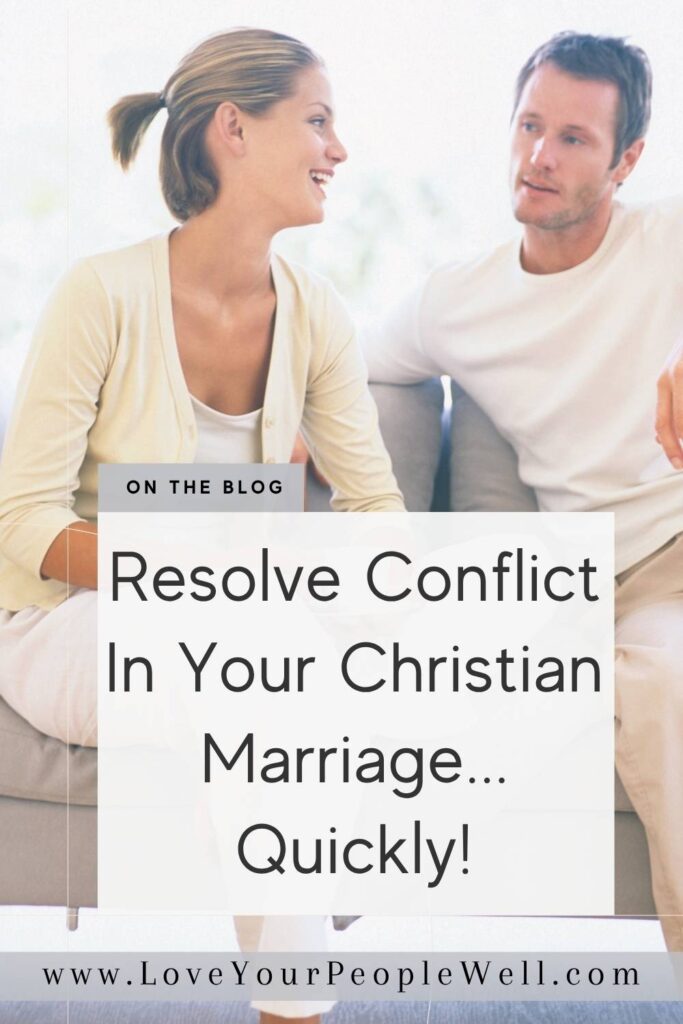Learn a straightforward process to resolving conflict in your marriage, from a Christian marriage therapist.
Resolving conflict will build marriage intimacy
Did you know that your relationship can grow deeper, closer, and better if you figure out how to handle conflict well?
I’ve been a marriage and family therapist for over 10 years. Everyone deals with conflict! But everyone can also learn how to resolve that conflict – and build deeper intimacy in the process.
Today, I want to share my straightforward process for healthy, happy, and holy conflict resolution.
This will definitely bless your marriage! You can also grab a free cheat sheet PDF of this 10-step process.
[This post may contain affiliate links. If a purchase is made, I may receive a small commission at no extra charge to you.]
10 quick steps to conflict resolution
Usually, the hardest part of resolving conflict in your marriage is handling the big emotions that come up.
One of you might get angry. Someone might yell, storm out, slam doors. There might be a night (or more) of the silent treatment, or a temptation to brush the whole thing under the rug to pretend all is well.
None of these are helpful.
If emotions are the biggest problem, you aren’t alone! Get more help for building emotional control right here.
But don’t wait for that skill to build before you start working through conflict areas!
These 10 steps are straightforward and will help you communicate better and connect more deeply right away! They are quick… not easy. But with practice, you and your spouse will be a pro in no time.
The 3 keys to resolving conflict in your Christian marriage
In my experience as a marriage therapist, there are 2 big keys for effectively managing conflict:
1. Hear each other.
2. Resolve the issue.
Of course, there are specific steps in each of those areas that will help you be successful. (Those are spelled out below!) But this is what it boils down to.
An important piece of the puzzle though, is that you must follow these 2 steps in order!
Hearing each other shrinks the anger, stress, and conflict. This is how you connect more and build intimacy.
Only after you’ve heard each other should you try to resolve the actual issue.
But yes, there is also a 3rd key, specifically for Christian marriages. And it should happen anytime and all the time.
3. Pray together.
A marriage can push things under the rug for awhile, or learn strategies to “fight fair.” But that is not the same thing as resolving the conflict.
And it is certainly not the same thing as growing deeper together through that conflict resolution.
Prayer invites the Holy Spirit to bring the peace, unity, wisdom, joy, and help that you need to resolve conflict. If you want to move forward with greater connection and intimacy, pray together and pray for each other.
Let’s jump into the 10 specific (and straightforward) steps for resolving conflict in your marriage.
RELATED: 5 Steps For How To Forgive And Forget In A Christian Marriage
PART ONE: HEAR EACH OTHER.
This is the CENTRAL part of building up your relationship. If you want to connect, deepen your marriage, and feel emotionally closer, you have to do these steps!
(1). Define the problem. Get clear together: what are you really disagreeing about?
(2) Label that problem simply. No blaming or criticizing. Just state the problem in a simple sentence, like “So, we’re on different pages about…”
(3) Take turn sharing. Each of you should have a few minutes to calmly share your point of view.
(4) Summarize what you heard. After your spouse shares their point of view, you get to summarize it! Paraphrase it in your own words. “I hear you saying that you think…”
WARNING! This is where you might get off-track if emotions are still high. Get some help for emotional control here.
You don’t have to agree with your spouse here. Just summarize what they said. What do they think? Why? Use their words if you need to. Try to understand.
Each spouse should get a turn with steps 3 & 4.
Next up:
(5) Find common ground. Somewhere in here, you agree with each other – even if it’s as basic as “we both value our marriage” or “we both want our kids to be healthy and happy.” Focus on the common ground.
(6) Make an emotional connection. If you can, try to understand why your spouse feels and thinks like they do. It will help you get to know them better! This can always be a great time to pause and pray together.
GO DEEPER: Build biblical communication patterns with help from the Communicating To Connect 40-day devotional on marriage communication.
PART TWO: RESOLVE THE ISSUE.
Now that you and your spouse are both feeling heard by each other, you’re more connected to move into part two. This is when you can actually solve the problem!
Of course, some topics are simply “agree to disagree.” A solution is not always needed. If that’s your situation, great! You’re ready to jump straight to #10.
(7) Brainstorm. Work together to list as many possible solutions as you can – the good and the bad, the silly and the extreme – the more the merrier! Don’t evaluate the ideas until the list is long and full though!
(8) Evaluate. Only when the list is long should you go back together to evaluate pros, cons, and how realistic and helpful each idea might be. This is a great time to pray and ask the Lord for wisdom and discernment!
(9) Make a plan. No one needs to be 100% happy, but you do need to agree. A plan likely needs to say: WHO will do WHAT, and WHEN will that happen? (Plus, make sure you understand WHY this is your plan.)
(10) Change the topic. Don’t stay upset! Go do a new activity or start a new conversation. Calm down and reconnect.
THROUGH IT ALL: PRAY TOGETHER.
Hopefully, it’s clear how these 10 steps will not only move you through the conflict but also move you closer to each other.
Even without conflict, being able to hear each other well and feel heard by each other is a huge part of healthy communication. It’s not just true in marriage!
And for Christians especially, managing conflict well is an active step toward living out the love, kindness, patience, forgiveness, compassion, and so many other elements that God calls us to show.
Can we do that without prayer? Nope.
What can you be praying about together, even when you’re angry or hurt, even when you still disagree, even when you might feel hopeless about resolving conflict in your marriage?
- The issue that is causing conflict
- Your reactions, good and bad
- Your conversations, word choices, tone of voice
- The problem-solving attempts and plans you make
- For a heart of unity, forgiveness, and peace
- For forgiveness and unity in your marriage
Pray for yourself and for each other. Pray together and pray alone. Just pray!
READ NEXT: 5 Great Scriptures To Pray For Your Family
Building intimacy as you resolve conflict in your marriage together
The first step? Hear each other.
Even if you never solve the problem, this step will be a game-changer. This moves you out of anger, stress, and conflict and into communication. You’ll connect. Intimacy will grow.
Then you can move to problem solving. You can brainstorm, talk together, and come up with a plan from a place of compromise, trust, and understanding.
Through it all, you’ll be praying together. That might be silent and alone, but hopefully over time it can be done together.
And enjoy the deeper connection that you will enjoy as you practice resolving conflict in your marriage together.
GO DEEPER: Build biblical communication patterns with help from the Communicating To Connect 40-day devotional on marriage communication.
Let's connect!
- JOIN MY EMAIL LIST for weekly tips, gospel encouragement, and a new coupon code each month.
- JOIN THE FAITH FIVER CLUB in our Patreon community, to support the ministry and get exclusive access to our private podcast, Q&As, and more.
- JOIN ME ON PINTEREST and on Facebook and Instagram too, for regular encouragement and fun.
And as they say... sharing is caring!
Related Posts:
- How To Solve Your 3 Biggest Marriage Communication Problems
- Handling Parenting Conflict As A Strong Parenting Team
- 5 Steps For How To Forgive And Forget In A Christian Marriage
- 9 Hot Tips To Make Sure Your Christian Marriage Intimacy Is Amazing In The Bedroom
- 5 Powerful Bible Verses To Improve Your Family Relationships
Disclaimers: I am a licensed therapist but my podcast, blog, and resources are not professional or personal advice. I am an affiliate for many of the resources that I link to, and may earn a small commission if you purchase through my link. Read my full disclaimer here.




